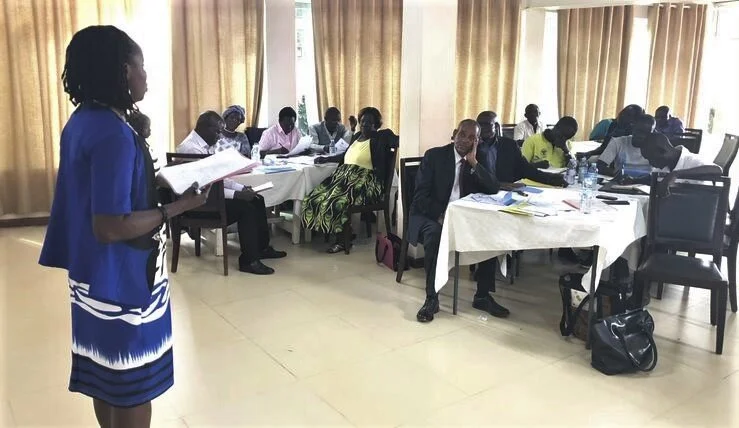The Refugee Engagement Forum in Uganda as an innovative approach to AAP
A process innovation for two-way feed-back in refugee responses
In Uganda, a new forum is re-defining meaningful engagement of refugees in the aid and support they receive at the highest level of national coordination. The Refugee Engagement Forum - commonly known as the REF, is a forum that brings together representative refugee leaders elected from settlements across the country to discuss and provide systematic feedback on the concerns of their communities to the Comprehensive Refugee Response Framework Steering Group (CRRF SG)[1].
The REF was established in Uganda in 2018 by the Office of the Prime Minister and UNHCR (the UN Refugee Agency). It ensures that the views and concerns of refugees directly inform strategic discussions and decision-making. In addition to its operationally flexible structures, the REF composition assures fair representation of gender, youth and nationality, reflecting the complex nature of the refugee settlements in Uganda.
Last week, U-Learn supported the OPM Department of Refugees, and UNHCR to publish a Good Practice Study on the REF. The study aimed to generate stronger awareness externally for the REF and to further strengthen its functioning.
The study was published on www.ulearn-uganda.org with a number of clear successes revealed, particularly on positive policy influence. One note-worthy success is the recent reflection of the views and preferences of the REF in the CRRF National Plan of Action 2021-2022, a high-level strategic document guiding the implementation of Uganda’s refugee response.
Mohammed Mukhtar, a 64-year-old refugee from Somalia who represents his community at the REF, commented on this success as part of the Good Practice Study: “Refugee voices and opinions from across 13 settlements were included in the final National Plan of Action. The REF facilitated shared decision-making on matters to do with pertinent issues such as Livelihoods, Education, and Health.”
When asked to comment about the REF more broadly, Mr. Mukhtar said: “In my role over the many years, I have realized that REF members can now scope and prioritize issues independently. They have showed change and maturity in their work. I feel the voice of my community can be heard where it really matters.”
Following the recent proposal to revise the Grand Bargain[2], participation of affected communities - or more precisely Accountability to Affected Populations (AAP) - has been recognized as one of the priority areas with “the most potential for system-wide transformative impact on the humanitarian ecosystem.”[3] One of the ways to tackle this area is to invest in innovative and inclusive approaches to AAP, like the REF, whose structures are replicable in all global refugee-response contexts, and whose successes are easily actionable.
Learn more
Read more about the REF and reflect on how this innovation could be adopted in your context, download the full REF Good Practice study here or get in touch with U-Learn via info@ulearn-uganda.org.
About U-Learn
U-Learn (Uganda Learning, Evidence, Accountability and Research Network) is designed to promote improved outcomes for refugees and host communities in Uganda. In collaboration with government and a wide range of implementers and stakeholders, U-Learn focuses on facilitating learning, conducting assessments, and amplifying the refugee voice in the protracted refugee crisis.
U-Learn is a consortium funded by UKAID under the BRAER (Building Resilience and an Effective Emergency Response) programme and delivered by The Response Innovation Lab (hosted by Save the Children), in consortium with IMPACT Initiatives and the International Rescue Committee.
References
[1] The CRRF Steering Group is the policy and decision-making body for the implementation of the CRRF according to the
CRRF National Plan of Action
[2] https://interagencystandingcommittee.org/grand-bargain
[3] https://www.thenewhumanitarian.org/analysis/2021/6/10/Grand-Bargain-international-aid-commitments-localisation



